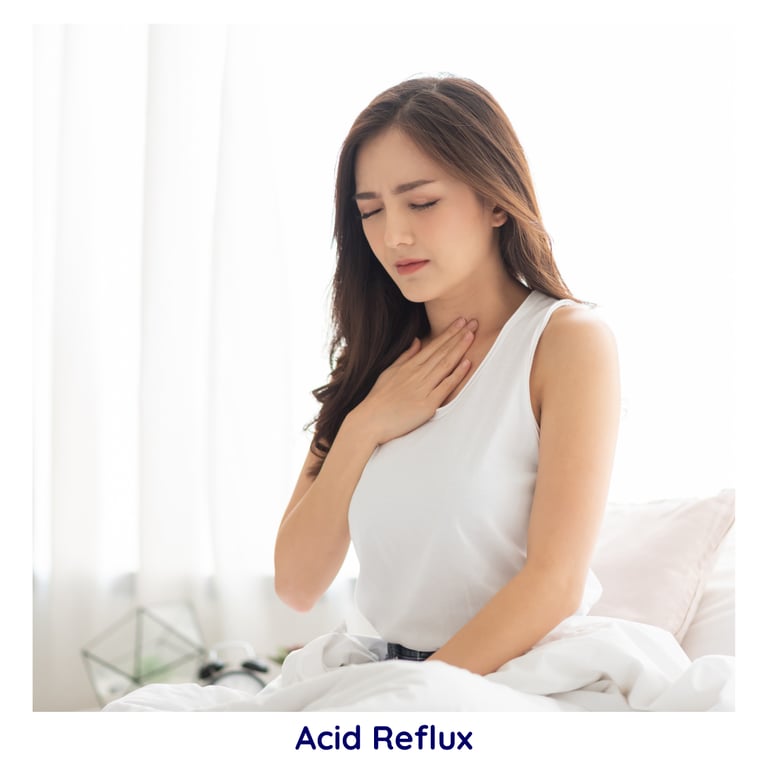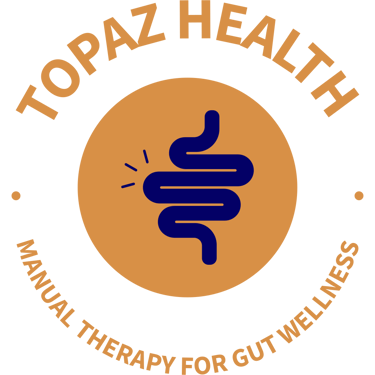
Understanding Reflux and GORD: Symptoms, Causes, and Diagnosis
Understand the signs, symptoms and diagnosis of Reflux and GORD. Acid reflux, occurs when stomach acid travels back into the oesophagus causing uncomfortable symptoms, one classic being heartburn. GORD is when you experience reflux regularly, impacting your daily life. Read our blog to learn more.
9/8/20243 min read
What are Reflux and GORD?
Reflux, commonly called acid reflux, occurs when stomach acid travels back into the oesophagus. This backward flow can cause uncomfortable symptoms, one classic being heartburn. Gastro-oesophageal reflux disease (GORD) is a more severe and chronic form of acid reflux and is reported to effect 1 in 5 people in Australia, most commonly in people over 40. If you experience reflux symptoms regularly, 2 or more times a week, or it impacts your daily life, you could be dealing with GORD.
Signs and Symptoms of GORD
GORD can present a variety of symptoms. The most common is persistent heartburn, a burning sensation in the chest or throat, particularly after eating.
Other signs and symptoms that may be present and indicative of GORD include:
Regurgitation of food or sour taste in the mouth
Difficulty swallowing, known as dysphagia or pain when swallowing
Oesophagitis - painful and inflamed oesophagus
Chronic cough or wheezing
Hoarseness or sore throat
Bad breath, known as halitosis
Feeling of a lump in your throat
Feeling the need to clear the throat
Upper abdomen or epigastric pain and discomfort
Pain between the shoulder blades
Chronic neck pain and stiffness
Tooth decay and gum disease
Bloating and belching
Nausea and vomiting
Risk Factors and Causes of GORD
Several factors may contribute to the development of GORD or aggravate reflux.
Some of the risk factors for GORD include:
Being overweight or obesity
Pregnancy
Hiatal hernia
Delayed stomach emptying
Smoking
Some of the following may potentially aggravate reflux:
Eating large meals or lying down right after a meal
Eating too quickly
Snacking close to bedtime
Eating certain foods like citrus, tomato, chocolate, peppermint, garlic, onions, or spicy foods
Drinking certain drinks, such as alcohol, carbonated beverages, coffee, or tea
Exercising after a meal
Stress
Complications of GORD
If left untreated GORD can lead to several complications. These may include:
Oesophagitis: This involves Inflammation of the oesophageal lining
Oesophageal Stricture: This is when narrowing of the oesophagus occurs caused by damage from stomach acid
Barrett's Oesophagus: This is a condition where continuous exposure to stomach acid changes the lining of the oesophagus, increasing the risk of oesophageal cancer
Respiratory problems: This can include asthma, chronic cough, or laryngitis
How is GORD Diagnosed?
To diagnose GORD your GP will take a review of your symptoms and medical history. If further investigation is needed, the following tests might be conducted:
Oesophageal pH monitoring: This measures the amount of acid in your oesophagus
Upper endoscopy: This involves using a flexible tube with a camera to inspect your oesophagus and stomach
Oesophageal manometry: This measures the rhythm and muscle contractions of your oesophagus when swallowing
Barium swallow: This involves drinking a barium solution to help outline the oesophagus and make visible in X-ray images
How is GORD treated?
Initially, your GP may suggest lifestyle changes to see if your symptoms improve. Some of these would include:
Losing weight where indicated. Excess abdominal weight can increase intra-abdominal pressure affecting gastric emptying and the function of the lower oesophageal sphincter.
Avoiding food and beverages that aggravate your reflux. Everyone's triggers are different so take note of what aggravates your reflux and avoid those things.
Eat smaller meals more frequently and chew food thoroughly.
Leave 2-3 hours between your last meal and going to bed.
Sleeping on your left side. Due to the angle of the oesophagus and the bulk of the stomach sitting on the left, this reduces reflux episodes.
Sleeping with the head elevated 20cm. Propping yourself up with a pillow or bolster can also help reduce nocturnal reflux episodes.
Quit smoking. Smoking aggravates reflux and weakens the lower oesophageal sphincter.
If lifestyle factors are not improving your symptoms adequately your GP may suggest medication. Some of these could be:
Antacids. These are medications that neutralise stomach acid. They are over-the-counter medicines and do not require a prescription.
Proton pump inhibitors or PPIs. These medications work by inhibiting the enzymes in the stomach that produce stomach acid. PPIs are not intended for long-term use. They are usually prescribed for 4-8 weeks to reduce your symptoms.
On rarer occasions surgery may be suggested. This is usually for people who have severe symptoms, aren't improving with medication or prefer not to take medication long-term or for those with hiatal hernia.
If you believe you might have GORD, it’s essential to consult with a healthcare professional for an accurate diagnosis and appropriate treatment plan.
Sources
Health Direct. GORD (reflux) https://www.healthdirect.gov.au/gord-reflux
NSW Government. Emergency Care Institute - Patient Fact Sheet. Gastro-oesophageal Reflux Disease (GORD) https://aci.health.nsw.gov.au/networks/eci/clinical/ed-factsheets/gastro-oesophageal-reflux-disease
GI Society. Canadian Society of Intestinal Research. Heartburn keeping you up at night? https://badgut.org/information-centre/a-z-digestive-topics/heartburn-keeping-night/


Contact
The Body Project
Level 4,6 Help Street
Chatswood
NSW, 2067
(02) 9884 8758
fiona@topazhealth.au
Quick Links
FAQs
Osteopathy for Gut Health
Osteopathy for TMJ
Fees
Resources
Copyright © 2024 | Topaz Health | Privacy Policy | ABN: 141 202 953 15


Blues Point Practice
117 Blues Point Road
North Sydney
NSW, 2060
0422713396
You Little Beauty
Shop 7, 33 Tramore Place
Killarney Heights
NSW, 2087
0422713396
